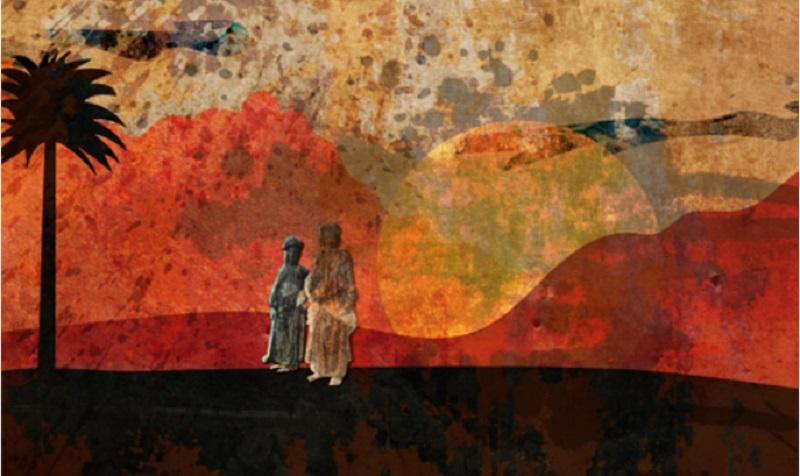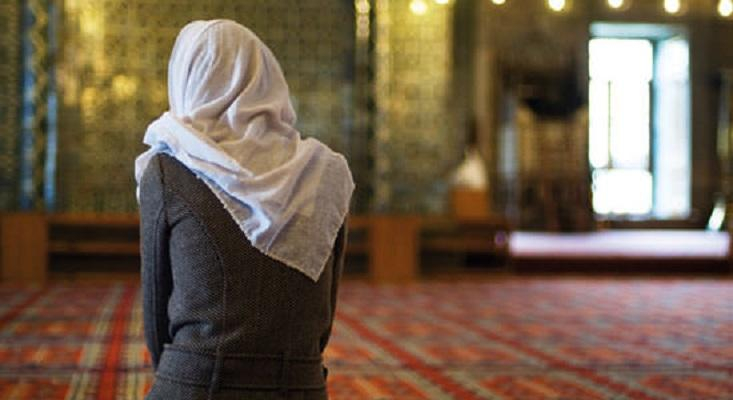Faith, Love and Conviction - Marriage Lessons from the Early Prophets
Faith
|
Sep 12, 2019
|
10 MIN READ

Editor's Note: This article is the last of a summer series we are producing on "Marriage and Families - A Multifaceted Landscape." We covered blended families, questions to ask before marriage, courtship traditions in modern times, the post-divorce landscape, single parenting and other topics from a Muslim-centric perspective. Check into the blog to read our series. We plan on revisiting and building upon this series in the coming months.
By Hosai Mojaddidi
When we think of what an ideal marriage looks like in Islam, the marriages of the Prophet Muhammad (saw) are likely to come to mind. Of course this makes perfect sense, as he was an exemplary husband and his wives were all righteous, talented and dedicated women in their own right. Generally speaking, however, marriage is a complicated subject and for most people, one of the biggest sources of stress (and happiness) on a daily basis.
I’ve been serving the Muslim American community as a spiritual counselor for more than 20 years, and a big portion of my experience has been working with couples who are struggling in their marriages. In the past, when I’ve brought up examples of ideal marriages from our tradition, which often were from the seerah of the Prophet Muhammad (saw), I was met with some resistance:
But I’m not the Prophet Muhammad (saw), and she’s not Khadija (radi Allahu anha), so we can’t be expected to act like them!

Fair enough. If we’re being honest, it is a pretty tall (and frankly impossible) order to expect every husband to measure up to the Prophet Muhammad (saw) and every wife to measure up to one of his wives. Yes, of course, we should all strive to follow their examples as much as possible, but until we get anywhere near their level, what can we do? Are there perhaps any other marriages in our Islamic history that may look a little less “perfect” and prove more relatable to some of our own experiences? The answer is, yes.
One of my favorite marriage examples to draw lessons from is that of Firawn and Asiya (radi Allahu ‘anha). Yes, you read that correctly and no, I haven’t lost my mind! I’m well aware of how strange it sounds, considering the fact that Firawn was a horrible and wretched tyrant/husband who was and remains to this day the paragon of evil in human form. But, there are many examples from his role as a husband and more importantly Asiya’s (radi Allahu ‘anha) role as a wife and how she dealt with him from which we can learn.
Before we explore that, let me be frank and say that there are many women (and men) right now in our community who are in marriages with bad people, and some with very, very, bad people. For a multitude of reasons, however, many of them feel stuck in their situation and believe that divorce is not an option; they accept their fate but certainly aren’t happy with it. So, aside from repeating the obvious and advising them to leave, which they often refuse to do anyway, how can we help them?
One thing we can do is remind them of Asiya’s (radi Allahu ‘anha) way of dealing with her tyrannical and miserable husband, Firawn. More than anyone else who suffered under his rule, Asiya (radi Allahu ‘anha) knew just how corrupt her husband was; and yet like many women before and after her, she wasn’t able to leave the marriage. Instead of losing herself or compromising her faith, however, she turned to Allah (S) and increased her love and reliance on Him. In other words, she didn’t become a victim in her marriage, but rather she resigned herself to the will of her Creator and put her complete trust and love in Him.

And for her strong conviction, what did she receive in the end? She was blessed with an orphan child who she raised to become a prophet of Allah (S) and the very man who would later go on to defeat her tyrannical husband and bring his evil reign to an end! She was also raised in ranks and given the noble position of being one of the four perfect women in Islam!
How many people out there who find themselves in a difficult marriage that they can’t just walk away from, for whatever reason, can say they’ve turned to God and put their faith entirely in Him? Many people who choose to stay in unhealthy relationships often suffer in silence, stewing in a vicious cycle of anger and resentment. This is partly because they haven’t learned how to truly submit to God’s will, turn to Him for guidance, or find a healthy and productive way to cope with their situation every day. Asiya (radi Allahu ‘anha) shows us that making Allah (S) a priority and never losing faith in Him, no matter how difficult or impossible our situation may be, will always lead us to success.
God’s promise to grant us ease after every difficulty, is in fact true, but only for those who believe and have certainty in His words. As an aside, it’s important to mention that for those who are in abusive circumstances, patience is not the appropriate response. Marriage is supposed to be a safe haven, not a source of pain, anguish and terror. While we can certainly learn a lot from Asiya’s (radi Allahu ‘anha) example, we should never use her story or anyone else’s to justify abuse or to suggest that anyone should endure physical, verbal or emotional abuse as a sign of their piety and patience. Instead, we should encourage people in such situations to seek professional help and know that Allah (S) is with the oppressed and will reward them for every second of suffering, hardship and pain they endure.
Another amazing example we can draw from is the marriage of Prophet Ayub (‘alayhi salam) and his wife Rahima (radi Allahu ‘anha). Known as the prophet of patience, both he and his wife went through unimaginable tribulations and endured incredible hardship for years; they lost all their material wealth, their home, their children; they suffered abandonment and ostracization from friends and family, endured severe poverty and hunger and had to manage a crippling and debilitating disease. Some scholars say they suffered for nearly 20 years this way. Despite everything they went through, they always remained steadfast, committed in their faith and loyal to one another.
It’s safe to say that most human beings would likely not be able to endure so many calamities at once and are spared this way, thank God. Even so, calamities do often strike us; struggles and challenges occur, especially in our marriages. And when they do, we must ask ourselves – what are we inclined to do? Do we look to our partner for strength, or do we turn against them? How much faith do we have that God will help us find a way out?
Over the years, I’ve spoken with many couples who have endured unimaginable and often inexplicable losses ranging from tragic accidental deaths, extreme financial debt, or debilitating injuries, and/or chronic/fatal illnesses. Life, as we all know, is unpredictable and suffering is indiscriminate. Allah (S) tells us repeatedly that this life is a test and that we will be tested with what we love the most. So, it should come as no surprise that how a couple deals with tragedy, loss, etc. is a test of not only their faith but also a reflection of their marital bond.
Many couples, unfortunately, do end up buckling under the pressure or falling into depression and turning against each other. But, we must learn from the example of Prophet Ayub (`alayhi salam) and his wife Rahima (radi Allahu ‘anha). They endured their hardship with beautiful patience and helped one another through their difficult times, and Allah (S) eventually rewarded them and restored every single thing they lost; their children, their wealth, their home, their community and their health.
If our faith is strong, then we know that tests are part and parcel of this world and that we must not let our trust in God crumble or our commitment to our spouses go to the wayside. Marriage, after all, is supposed to be an eternal bond and not just a fairweather one.

The last marriage from the past that I believe serves as a great example is the one between Prophet Ibrahim (`alayhi salam) and his wife Sarah (radi Allahu ‘anha). From their story we learn about what trust, selflessness and sacrifice looks like between a loving husband and wife.
A great example from their story is when Ibrahim (`alayhi salam) was confronted by a tyrant about the identity of Sarah (radi Allahu ‘anha) and was forced to lie and claim her as his sister. He told her what he had done and then put his faith in her to handle the situation with wisdom, and she did. She not only trusted her husband’s words, but she proved herself competent and strong. He honored her by putting his faith in her, and she honored him by doing the same.
After she was summoned by the tyrant and he tried to take her by the hand, she did not back down. She had full trust in Allah (S) that He would protect her, and indeed He did. Every time the tyrant raised his hand to approach her, Allah (S) caused his hand to become paralyzed. After a few failed attempts, he became so afraid that he asked Sarah to pray for him that Allah (S) would cure him, and then he promised to let her go.
As a reward, and to protect himself from any further punishment, he gave Sarah (radi Allahu ‘anha) a maidservant named Hajar (radi Allahu ‘anha). As we all know, later on when Sarah (radi Allahu ‘anha) learned that she was sterile, she offered Hajar (radi Allahu ‘anha) to her husband as a second wife so that he could bear a child of his own.
Many may assume that Sarah (radi Allahu ‘anha) made a great sacrifice for her husband by offering another woman to him in marriage. However, the truth is that Sarah (radi Allahu ‘anha) was a believer first and foremost before she was a wife, and she had strong faith in Allah (S). She accepted every situation they were put in with patience, and she responded with wisdom. And for all that she endured, Allah (S) rewarded her later in her old age with something she herself never thought possible, a son.
Not only did she become pregnant and bear a child of her own, but she would go on to raise a future prophet. Prophet Isaac (`alayhi wa salam) was a great and noble prophet just as his older brother Prophet Ismail (`alayhi wa salam) was. They both were two great pillars that Prophet Ibrahim (`alayhi wa salam) was blessed with, and their legacy continued for centuries. From Prophet Isaac (`alayhi wa salam) came all the prophets from Israel ending with Prophet Isa (`alayhi wa salam), and from Prophet Ismail (`alayhi wa salam) came only one prophet, the most superior of all of them, the Beloved of Allah (S), the Prophet Muhammad (saw).
Although Hajar (radi Allahu ‘anha) is the one who bore Ismail (`alayhi wa salam) through whom the world was blessed with the most beautiful gift – the Prophet Muhammad (saw); it is Sarah (radi Allahu ‘anha) who had the magnanimity and selflessness to encourage her husband to marry Hajar (radi Allahu ‘anha). So, to Sarah (radi Allahu ‘anha) the world owes a great debt of gratitude!
For couples who are at a crossroads in their marriage and may be forced to make uncomfortable choices for the greater good, whatever the situation may be, it can be useful to look at the resolve and conviction of Sarah (radi Allahu ‘anha) and how Allah (S) rewarded her and honored her for her many sacrifices and her strong faith.

Sometimes, in our myopic and materialistic view of the world, we understand the word sacrifice to mean some type of loss, which explains why it can be so difficult to ever sacrifice for another. In reality though, just as many lessons from the life of Prophet Ibrahim (`alayhi wa salam) have taught us, including the great sacrifice he was asked to make with his son Ismail (`alayhi wa salam) as well as the many sacrifices Sarah (radi Allahu ‘anha) made, sacrificing for the sake of God is never about personal loss but rather an opportunity to grow and prove the sincerity of one’s faith.
May every couple who is being tested in their marriage, whatever that test may be, learn from the incredible examples presented above and find the resolve to work on their marriage by first working on their relationship with Allah (S). For if there is anything to learn from the many successful marriages found in our Islamic history, whether they were epic love stories or less than perfect examples (like some of the ones above) it is that God must always be the singular most important connection that ties the hearts together. Insha’Allah any marriage focused on God is destined for success.
Hosai Mojaddidi is the cofounder of MH4M, a site dedicated to providing mental health related content tailored for Muslim communities. She has served the American Muslim community for over 20 years as a spiritual advisor, mental health advocate, writer/editor, mediator, interfaith organizer and public speaker, covering a variety of topics including women's issues, marriage/family, youth/teen issues, education, self development, interfaith bridge building, spirituality, etc. She currently offers monthly self-development and spiritual wellness classes for Muslim women at Ta'leef Collective and the MCC East Bay, and offers regular educational workshops for students and teachers at local Islamic schools in the Bay Area. To learn more about Hosai, please visit here.
Subscribe to be the first to know about new product releases, styling ideas and more.
What products are you interested in?

